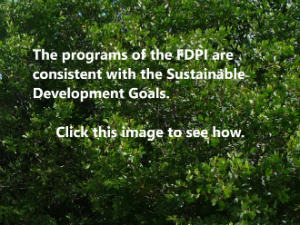By Lloyd Gardner
First published as an Op-ed in the Virgin Islands Source on March 2, 2012
An October 2011 Associated Press article on climate change stated that a leading skeptic of climate change, after conducting his own study, concluded that the earth’s surface temperature is rising. This was notable because this particular climate skeptic, Richard Muller, is said to be a prominent physicist. Whether or not the conclusions reached by Dr. Muller will influence other skeptics to change their minds about global warming is debatable.
What is not debatable is that climate is changing, and weather has become much more variable. This variability in weather was vividly displayed in the United States in 2011. People in the U.S. Virgin Islands, witnessing the extreme weather events on the U.S. mainland, thanked their lucky stars that the USVI was not prone to such weather variability. Such persons seemed either not to recognize local weather variability or have not made the link between local weather variability and climate change.
The fact is that the U.S. Virgin Islands, as with many of the islands in the Caribbean, are extremely vulnerable to the effects of climate change. The Caribbean Community Climate Change Centre estimates that the economic impact of the 2004 hurricane season in the Caribbean was in excess of US$4.2 billion. Some countries were severely impacted, with the losses and damage in the Cayman Islands amounting to 138 percent of GDP, and losses in Grenada amounting to 212 percent of GDP.
The cost of damage in the U.S. from weather-related disasters in 2011 was estimated at $52 billion (and that’s only for the 12 disasters where the cost of each exceeded $1 billion). While damage from weather events in the USVI has not been directly attributed to climate change, there is concern that climate change will adversely impact critical areas of community development, particularly human health, economic activities, agriculture, social infrastructure, and environmental health.
The USVI has an extensive disaster management program (www.vitema.gov), coordinated by the V.I. Territorial Emergency Management Agency. However, preparing for climate change involves more than disaster management.
It is projected that the 2-3 degrees Celsius increase in temperature forecasted under current climate change scenarios will affect crops, animals and humans, making it necessary to review what crops we farm, farming practices and even where farms are located. Such a proactive response to climate change is known simply as climate change adaptation planning. This involves the following basic steps:
– Integration of climate change adaptation strategies into the physical planning process;
– Integration of adaptation planning into environmental assessment of projects;
– Development of implementation strategies for adaptation in key economic sectors;
– Development of adaptation strategies to protect human health;
– Development of adaptation strategies for agriculture and food;
– Building capacity to identify climate change risk and reduce vulnerability.
The Global Change Research Program (www.globalchange.gov) is a coordinating mechanism for federal research on changes in the global environment, and state governments are encouraged to develop state programs.
Although the USVI has not established a climate change program, some of the public sector disaster management agencies have initiated discussion regarding such a program. Similarly, a number of nonprofit, nongovernmental organizations have developed climate change initiatives, which could be linked into a territorial program.
The University of the Virgin Islands currently has a project focused on climate change and health (myhealthwhatsclimatechangegottodowithit.com). Although UVI’s project focuses mainly on public awareness, the project is working with a number of civil society organizations throughout the territory to design several community projects on climate change and health.
The Foundation for Development Planning (https://www.fdpi.org) is a participant in the dialogue concerning the establishment of a climate change program for the U.S. Virgin Islands. Institutions and persons interested in learning more about climate change implications for the territory can contact the foundation at 714-0936.
Original article published in the St. Thomas Source.

No Comments Yet - be the First!